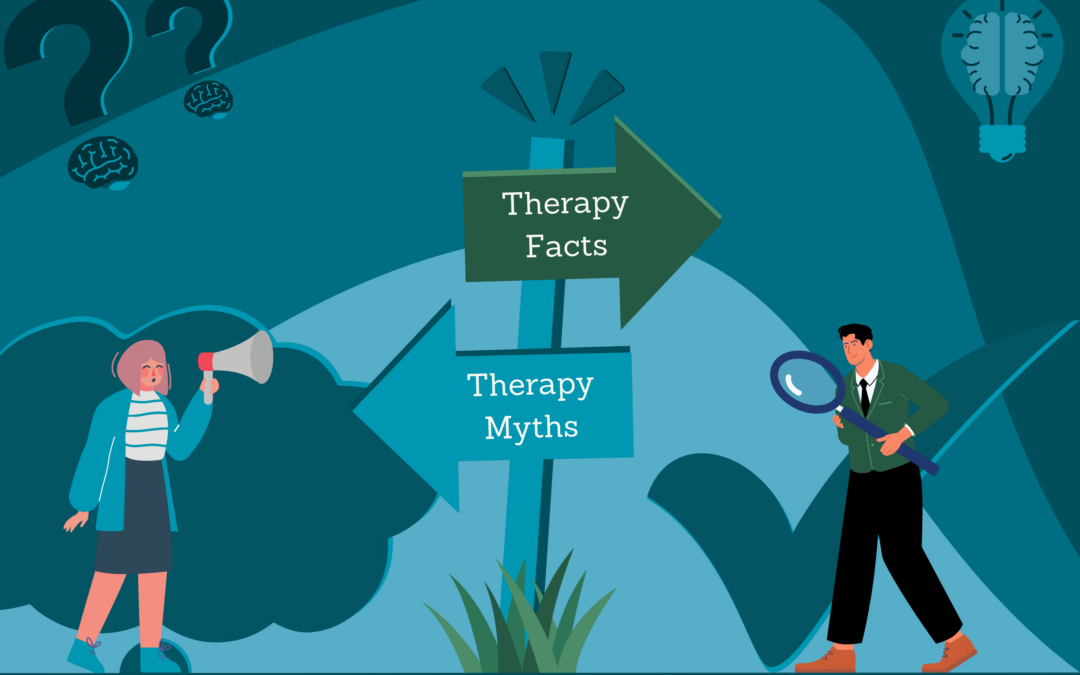Despite the proven benefits of therapy for mental health, it still remains a subject often misunderstood and shrouded in misconceptions. The misunderstandings surrounding therapy can deter people from seeking the help they need and perpetuate a social stigma around mental health issues. This blog post therefore seeks to address common misconceptions about therapy and therapists, and shed light on the truth.
Myth 1: Therapy Is Only For People with Mental Illness
A persistent misconception about therapy is that it’s only for people with mental illnesses. This misunderstanding can prevent many people who would benefit from therapy from utilizing it as a tool for dealing with any of life’s difficulties.
Therapy isn’t reserved solely for people with significant mental health disorders. It’s a resource for anyone struggling with any life’s challenges – from everyday stress to relationship conflicts to self-esteem issues. Therapy is about learning coping strategies, building resilience, and ultimately, enhancing mental health – not just addressing psychiatric conditions.
Myth 2: Therapists Just Sit and Listen
Many people have the impression that therapists merely sit and listen passively during sessions. While empathetic listening is a crucial part of a therapist’s role, they also actively engage with their clients. Therapists might offer insights, guide self-exploration, teach coping strategies, or facilite the processing of emotions. The therapeutic relationship is a dynamic one, and therapists therefore help clients explore and understand their thoughts, feelings, and behaviors to achieve their goals.
Myth 3: Therapy Is Better If It Works Quickly
In many aspects of life, efficiency equals effectiveness. This is not the case for therapy however, and having this mindset can lead to unrealistic expectations and disappointment. Therapy is not a quick fix. Instead, it’s a process that demands time, effort, and patience. Some people may notice changes after a few sessions, but lasting improvement typically requires a longer-term commitment.
Myth 4: Therapists Want to Blame Your Parents
There’s a persistent stereotype that therapists attribute all of a person’s problems to their parents or early life experiences. While it’s true that family dynamics and childhood experiences can influence a person’s current mental health and behavior, therapists do not focus solely on blaming parents. The goal of therapists is to help clients understand the various factors – biological, psychological, and environmental – that influence their mental health, but they actually encourage acceptance rather than assign blame.
Myth 5: Therapists Will Make You Lie On A Couch
The portrayal of a client lying on a couch while talking to a therapist is an outdated stereotype stemming from the era of Freudian psychoanalysis. In modern practice, therapists typically engage in face-to-face conversations with clients in a comfortable, casual setting. The couch image is far from the norm in today’s therapy sessions.
Myth 6: Therapy Never Ends
A common misbelief is that once you start therapy, it becomes a never-ending process. This can cause potential clients to hesitate in seeking therapy, fearing they’ll become dependent and won’t be able to function without it.
The truth is, many therapies are goal-oriented and are designed to empower clients to manage their own mental health. The duration of therapy varies depending on the person, the issues they are dealing with, the therapeutic goals they set with their therapist, and the form of therapy, but the vast majority of therapists want their clients to “graduate” from their work together.
Myth 7: All Therapists Are the Same
Another prevalent myth is that all therapists are the same, providing identical methods of treatment. In reality, there are a vast array of therapeutic approaches and specializations between therapists. For example, some therapists might specialize in cognitive-behavioral therapy (CBT), while others might prefer approaches like psychodynamic therapy, humanistic therapy, or even dialectical behavior therapy (DBT). Not only do therapists differ in their methodologies and areas of expertise, but they also differ in their personalities! This is especially important because therapists’ demeanors can significantly influence the therapeutic relationship, which is the number one indicator of therapeutic success. This further illustrates how essential it is to find a therapist who, not only suits the specific issues you want to address, but also is a good fit for you personally.
Myth 8: Online Therapy is Less Effective than In-person Therapy
With the rise of technology and telehealth, a growing myth is that online therapy is less effective than traditional in-person therapy. Some people believe that the therapeutic relationship cannot be properly established or maintained through a digital platform, and therefore, the benefits of therapy may be reduced. In reality however, research has shown that online therapy can be just as effective as in-person therapy for a wide range of mental health issues. Moreover, online therapy can provide accessibility for people who may not be able to attend in-person sessions due to geographical location, physical disability, or other constraints.
In Summary
Myths and misconceptions about therapy and therapists can prevent people from seeking the help they need and perpetuate the stigma around mental health. Debunking these myths is therefore crucial for encouraging help-seeking behavior. By working together to debunk these myths and illuminate the truth about therapy and therapists, we all can pave the way towards embracing healing, growth, and overall greater mental health in our society at large.


Recent Comments